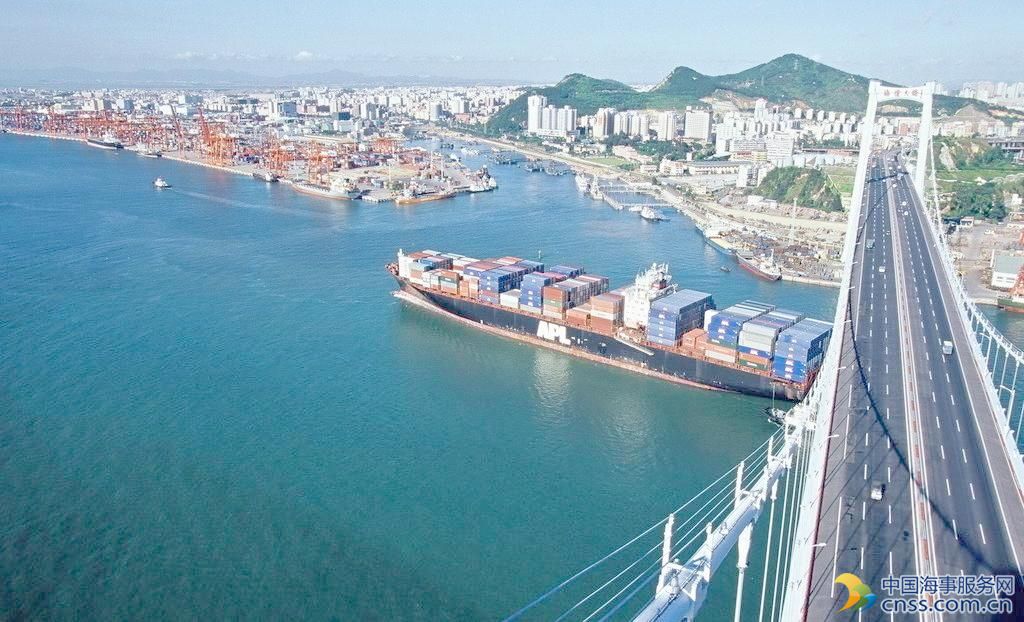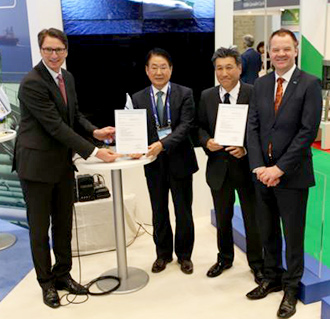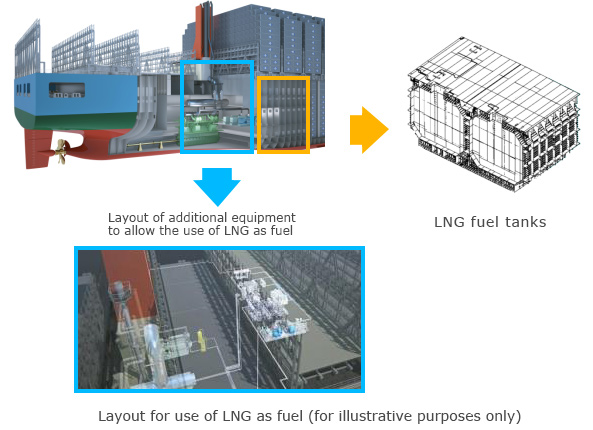MOL Earns AIP for Design of LNG-powered, Ultra-large Containership- Preparing for Environment-friendly 20,000 TEU-class

Mitsui O.S.K. Lines, Ltd. (MOL; President & CEO: Junichiro Ikeda) today announced that, DNVGL (headquarters: Germany) issued an Approval In Principle (AIP) to MOL and Samsung Heavy Industries, Co., Ltd. (SHI; President and CEO: Dae-young Park; headquarters: Seoul, South Korea) for the future design of a series of four LNG-powered 20,000 TEU containerships (Note 1), which have been under construction.
MOL signed a deal for the series of containerships with SHI in 2015. The ships were designed in anticipation of using LNG as a fuel, in light of more stringent environmental regulations that will take effect in the years to come. At the construction stage, MOL and SHI developed a basic plan targeting vessels in service, performance evaluation, compliance with new regulations, and risk assessment (Hazard Identification Study (HAZID)) (Note 2) in a joint study, and completed the basic design in March.

AIP certificate acquisition ceremony
(MOL Managing Executive Officer Yoshikazu Kawagoe, second from the right)
Global regulations on exhaust emissions from merchant vessels, not only by the International Maritime Organization (IMO) and other specialized international bodies, but also by countries all over the world are becoming tighter. MOL have proceeded studies on the use of LNG fuel in light of growing demand for next-generation clean fuels to replace conventional heavy fuel oil, because LNG can significantly reduce emissions of CO2, a major contributor to global warming, as well as NOX and SOX, which cause acid rain and other problems.
Design Characteristics
Optimal retrofit plan targeting vessels in service
Suitable LNG fuel tank layout and design for ultra-large-scale containerships
Suitable LNG fuel supply system to ensure maximum engine power output for ultra-large-scale containerships
Dual-fuel engine systems that allow the use of either LNG or heavy fuel oil
Measures for LNG leakage in case of emergency, in consideration of the ultra-large-scale containership’s special characteristics.
LNG bunkering system for the vessels has not been established yet, but is expected in the near future as studies on the use of LNG as a clean, environmentally friendly fuel are underway around the world.
MOL positions this series of vessels as its environmentally advanced next-generation ships. The first vessel of the series, the MOL Triumph, was delivered on March 27 (Note 3), which can be converted to run on LNG fuel when the LNG supply is commercially completed in the future.
MOL continually pushes ahead with its “ISHIN NEXT – MOL SMART SHIP PROJECT -,” develops and introduces new technologies that will reduce vessels’ environmental impact and ensure safe operation, and offers safe, reliable transport services.

(Note 1) For details, please refer to the press release on March 2, 2015:
“MOL Expands Large-scale Containership Fleet”
(Note 2) HAZID: An assessment method to identify hazards (potential risk sources) and occurrence frequencies for the conceptual design, and develop measures to reduce these frequencies. This process improves reliability and safety in the conceptual design.
(Note 3) For details, please refer to the press release on March 28, 2017:
“World’s Largest Containership Delivered, MOL Triumph”
Source: MOL
HEADLINES
- Do shipping markets want Biden or Trump for the win?
- All 18 crew safe after fire on Japanese-owned tanker off Singapore
- Singapore launching $44m co-investment initiative for maritime tech start-ups
- Cosco debuts Global Shipping Industry Chain Cooperation Initiative
- US warns of more shipping sanctions
- China continues seaport consolidation as Dalian offer goes unconditional